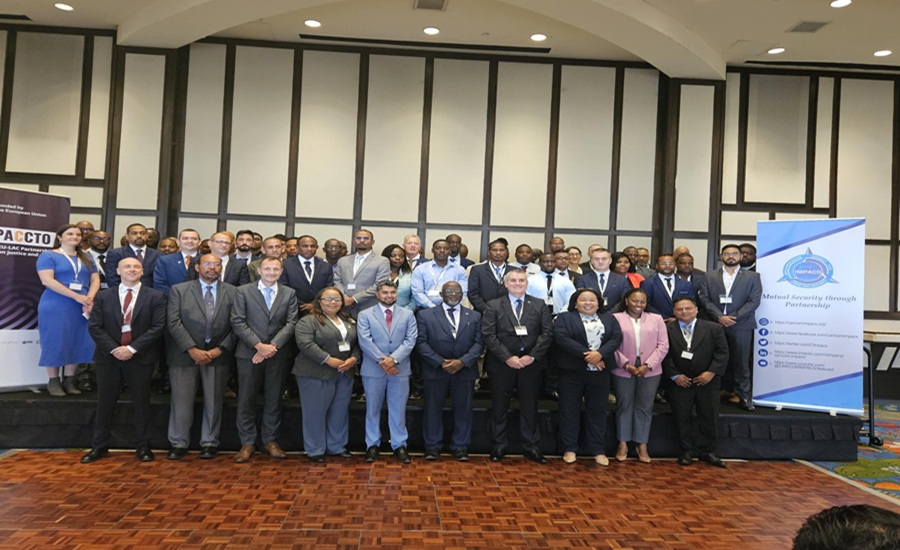CARICOM IMPACS, EU AND FRANCE PARTNER TO COMBAT ILLEGAL FIREARMS TRAFFICKING
Illicit trafficking in firearms and ammunition remains one of the most pressing transnational threats in the Caribbean Region, contributing directly to escalating violence and undermining public security.
These were the sentiments expressed by speakers at the opening ceremony of a five-day firearms training workshop, which is being collaboratively hosted by the Caribbean Community (CARICOM) Implementation Agency for Crime and Security (IMPACS), the European Union’s (EU) Europe-Latin America Programme of Assistance against Transnational Organised Crime (El PACCTO 2.0) and France’s Technical Cooperation Support Program for the Fight against Organized Crime in the Caribbean Region (ALCORCA) in Port-of-Spain, Trinidad and Tobago, in June 2025.
Lt. Col. Micheal Jones, Executive Director, CARICOM IMPACS, said the devastating impact of illegal guns in the Caribbean cannot be overstated. “These instruments of violence fuel gang warfare, drive up homicide rates and undermine the peace and stability essential for our sustainable development”, he lamented.
He explained that the training, which was a direct outcome of the collaborative spirit fostered by CARICOM IMPACS, EL PACCTO 2.0 and ALCORCA, is a significant step in their collective efforts to combat the scourge of illegal firearms that threaten Latin American and Caribbean societies.
Col. Jones also stated that CARICOM IMPACS, in response to this pervasive threat, established the CARICOM Crime Gun Intelligence Unit (CGIU), which was designed to be the nexus for intelligence-led operations, analysis and information sharing across Member States. He noted that the success of the CGIU hinges on the robust participation and adherence of CARICOM Members States and urged them to observe the established protocols for intelligence gathering and investigation for the Region’s security architecture to function optimally.
Mr. Michel Segura, Deputy Director, EL PACCTO 2.0, said the training was a milestone event as it was the first tripartite collaboration among CARICOM IMPACS, EL PACCTO 2.0 and ALCORCA geared towards fighting against transnational organised crime in the Region.
“This training represents more than a technical event. It is a common vision for a safer, more prepared, more connected regional space to fight against firearms trafficking. The response to this threat can only be collective, co-ordinated and operational, based on international co-operation where it involves information exchange between experts, promotion of good operational practices, building common response mechanisms and creation of trusted professional relationships,” he asserted.
EL PACCTO 2.0 focuses on combating transnational organised crime and dismantling criminal markets in Latin America and the Caribbean. The programme, through its operational component, addresses drug trafficking, arms trafficking, human trafficking and other criminal markets. Through international cooperation, it strengthens institutional capacities and promotes the exchange of information. Additionally, it fosters collaboration between security forces and judicial authorities to enhance effectiveness in tackling these threats.
Mr. Fabrice Coussot, International Technical Expert on Organised Crime and Narco Trafficking, ALCORCA highlighted that this training was the 50th such activity since the ALCORCA programme was established nine years ago. “More than ever, we are convinced that training, sharing intelligence and expertise are the only way to tackle the threats we face. This is particularly true in the case of arms trafficking,” he emphasised.
Delivering the feature address, Mr. Videsh Maharaj, Permanent Secretary, Ministry of Homeland Security, Trinidad and Tobago said studies have shown that regionally, the Caribbean suffers violent death rates nearly three times the global average, with over 50% of homicides involving firearms.
Recalling statistics, he noted that from 2009 to 2018, CARICOM’s intelligence reports show the seizure of over 22,000 illicit firearms and more than 300,000 rounds of ammunition across the sub-region. Additionally, United States (US) government tracing records reveal that between 2018 and 2022, the Bureau of Alcohol, Tobacco, Firearms and Explosives (ATF) traced 7,399 firearms recovered in the Caribbean, with 73% identified as originating in the US. In 2024 alone, ATF traced over 616,000 firearms globally, including those seized in Caribbean nations.
“Understanding these dynamics, Trinidad and Tobago remains committed to forming stronger alliances. This includes collaboration through CARICOM IMPACS, joint regional frameworks like the Caribbean Firearms Roadmap, which now counts 16 participating countries, and technical assistance led by the United Nations (UNLIREC), with backing from Canada, the United Kingdom (UK), Germany, and the EU,” he assured.
He advised participants at the workshop to take advantage of every session, “share your experiences, and forge partnerships that outlive this workshop. Coordination built on relationships is what turns policy into action.”





